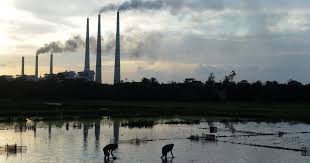Maharashtra Explores Ban on Petrol and Diesel Vehicles in Mumbai to Combat Pollution
Politics Politics of IndiaPosted by NewAdmin on 2025-01-29 09:50:40 |
Share: Facebook | Twitter | Whatsapp | Linkedin Visits: 54

Mumbai, one of India's most populous and economically significant cities, is facing a severe air pollution crisis. In response, the Maharashtra government is actively considering a proposal to ban petrol and diesel vehicles within the city limits to improve air quality and promote sustainable transportation. The initiative, if implemented, could mark a significant step toward reducing carbon emissions and creating a cleaner urban environment.
Why the Ban is Being Considered?
Mumbai has been grappling with deteriorating air quality, which has led to an increase in respiratory illnesses and environmental concerns. According to recent reports, vehicular emissions are among the major contributors to air pollution in the city. The high concentration of petrol and diesel vehicles, combined with congested traffic conditions, has resulted in excessive pollution levels.
Government officials believe that transitioning to electric and compressed natural gas (CNG)-powered vehicles could significantly lower pollution and contribute to a healthier living environment. As part of this effort, a special panel has been formed to study the feasibility and impact of enforcing such a ban.
Challenges in Implementing the Ban
While the proposal is ambitious, several challenges must be addressed before it can be implemented:
Lack of EV Charging Infrastructure:
One of the biggest obstacles in phasing out petrol and diesel vehicles is the limited availability of charging stations for electric vehicles (EVs). Currently, Mumbai lacks the necessary infrastructure to support a large-scale shift to EVs, making it difficult for vehicle owners to transition smoothly.
High Cost of Electric Vehicles:
Although EV adoption is increasing, the cost of electric vehicles remains relatively high compared to traditional petrol and diesel cars. Without government subsidies or financial incentives, many vehicle owners may find it challenging to afford an EV.
Ongoing Metro and Infrastructure Development:
The city is undergoing massive metro and infrastructure development projects, which could affect the implementation of this policy. Construction activities already contribute to traffic congestion, and adding new regulations could further complicate transportation in Mumbai.
Resistance from Transport and Business Sectors:
Auto-rickshaw operators, taxi drivers, and logistics businesses that rely on fuel-powered vehicles may strongly oppose the move. The government will need to find a way to transition these sectors gradually to avoid economic disruptions.
Possible Solutions and Government Strategy
To ensure a smooth transition, the government is considering several measures, including:
Expanding EV Charging Stations: The state may collaborate with private companies to rapidly increase the number of charging stations across Mumbai.
Financial Incentives: Subsidies and tax rebates could encourage citizens to switch to electric or CNG vehicles.
Gradual Implementation: Instead of an immediate ban, the policy could be introduced in phases, starting with specific zones or vehicle types.
Alternative Public Transport Enhancements: Investments in metro expansion, electric buses, and shared mobility options could help reduce dependence on private vehicles.
Search
Categories
Recent News
- Hyderabad's Trans Community Under Scrutiny for Extortion
- Hyderabad Gears Up for Messi's Magical Visit
- Cyberabad's Fight Against Sex Trafficking: Rescuing Victims, Breaking Rackets
- Hyderabad Gears Up for Messi's Magical Night
- Drug Abuse Among Children: A Startling Reality
- Hyderabad Senior Scammed: Digital Arrest Scam Costs Rs 45 Lakh
- Maharashtra's AI Revolution: Empowering Cybercrime Investigations
- Hyderabad's Alarming Rise in Credit Card Scams
Popular News
- Navigating IPO Market Dynamics Amid Volatility and Regulatory Changes
- Innovative Green Practices and Environmental Initiative
- Massive Worldwide Microsoft Outage Disrupts Multiple Sectors
- తెలుగుదేశం పార్టీ - పేదరికాన్ని నిర్మూలించడంలో వాగ్దానం
- Universities Embrace Remote Learning Technologies Amidst Ongoing Pandemic